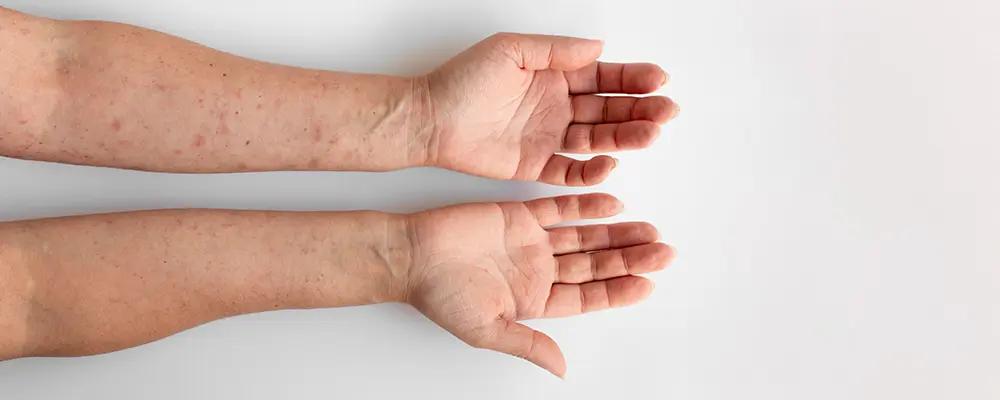Introduction
Eczema and hives both are skin conditions. At first glance, eczema and hives look like same because both condition’s symptoms are red and itchy skin—which may seem confusing to most. However, despite these superficial similarities, they are distinct conditions with different causes triggers, treatments, and prognoses. It is essential to comprehend the difference between hives and eczema to effectively manage and treat the symptoms on time.
What’s the Difference between Hives and Eczema?
Common Facts About Eczema
- Eczema can present differently in people of color, causing symptoms like goosebumps, skin flakiness, and swelling.
- Specific regions, such as the extremities (arms and legs), face, or scalp, are frequently affected by eczema.
- It is commonly linked to other immunological conditions such as asthma, allergic rhinitis, and food allergies.
- Although childhood eczema may be controllable, it’s important to manage symptoms by avoiding irritants.
Eczema: The Quirky Reaction Immune System’s
Atopic dermatitis, another name for eczema, is a chronic condition characterized by red, dry, itchy, and inflamed skin. It is often associated with the immune system’s reactions. External factors such as allergens, irritants, stress, asthma triggers or family history of allergies may be responsible causes of eczema.
Eczema more commonly tends to have a relapsing-remitting progression, with periods of exacerbation followed by times of remission. It is more common in children, with symptoms sometimes improving with age.
Eczema typically appears within the first six months of infancy and can last for several years in about 60% of cases. Up to 75% of affected individuals will have entered remission by the age of 15. Though, some individuals might still be susceptible to flare-ups and dry skin, and some individuals relapse with eczema, especially on their hands and feet. The symptoms of eczema in adults are typically more severe and chronic.
There are several types of eczema, each with various symptoms and causes. Common symptoms include:
- Cracked and scaly skin
Rash - Intense itching (at night which tends to worsen)
- Dryness
- Scratched discolored patches on the skin
- Bumps raised (sometimes filled with pus or crusted edges)
- Patchy rough skin
Here are some of the common eczema triggers:
- Prolonged, hot baths or showers
- Excessive rubbing or itching
- Perspiration
- Extreme heat or freezing temperatures
- Harsh cleansers, detergents, and soaps
- Fabrics made of wool and synthetics
- Allergens (dust, pollen, dander)
- Physical irritants (sand or smoke)
- Stress or anxiety
Common Facts About Hives
- Chronic idiopathic urticaria refers to cases where specific triggers are hard to identify.
- Hives might appear or disappear for a few hours or days at a time.
- Hives can be acute (linked to singular allergic reactions) or chronic.
Hives: The Itchy, Transient Visitors
Urticaria, often known as “Hives,” appears on the skin as a raised bumpy area, red or itchy welts. They frequently develop from an allergic reaction to food, medicine, or other allergens and might appear unexpectedly. Hives, in contrast to eczema, are usually acute and can self-disappear within hours to days. On the other hand, chronic hives can last longer and can need more intensive care. Common factors that cause hives are allergic responses and, they may be triggered by:
- Allergic reactions (common culprits)
- Physical factors (temperature, humidity, vibrations)
- Autoimmune triggers (antibodies responding to allergens or circumstances)
Also read: Chronic Spontaneous Urticaria: Managing Frustrating & Unpredictable Hives
Differentiation Between the Conditions: Hives vs Eczema
Even with these physical resemblances eczema and hives differ greatly from one another. Eczema is a chronic condition that frequently needs constant care to prevent flare-ups. It is linked to a deficient skin barrier, which increases skin sensitivity to irritants and infections and makes the skin drier. On the other hand, hives are usually acute, short-term conditions and subside if the allergen is eliminated or after taking antihistamine medication.
1. Appearance-wise
- Eczema: Appears as small vesicles that may ooze and produce scabs when touched appear on red plaques.
- Hives: These resemble swollen, red plaques that resemble nettle stings.
2. Duration
- Eczema: A long-standing medical condition that occasionally flares up.
- Hives: Generally, they might be acute (lasting minutes to hours) or chronic (recurring).
3. Triggers
- Eczema: Associated with dry skin and immune system malfunction.
- Hives: Physical environmental factors, autoimmune triggers, or allergic reactions.
Preventing The Spread Of Bronchitis
To prevent the spread of bronchitis individuals can:
- Encourage frequent handwashing with soap and water or using hand sanitizer, especially after coughing, sneezing, or touching surfaces in public places.
- Clean and disinfect frequently touched surfaces, such as doorknobs, countertops, and electronics, to reduce the risk of transmission.
- Educate others about the importance of staying home when sick and seeking medical attention if symptoms worsen or persist.
Correlation: Hives vs Eczema
The correlation between eczema vs. hives lies in their immunological underpinnings. Both conditions can be considered manifestations of the body’s hypersensitivity to certain triggers. In eczema, the immune system reacts to various environmental factors, leading to skin inflammation. In the case of hives, the reaction is often more immediate and can be linked to a specific allergen.
Treatment and Prognosis: Hives vs Eczema
1. Treatment
- Eczema: Using moisturizers to prevent dryness, topical corticosteroids to lessen irritation and inflammation, and avoiding recognized triggers are some of the treatment methods for eczema.
- Hives: Antihistamines are the key component of treatment for hives; they relieve itching and lessen the appearance of welts. When first-line therapies for hives are ineffective, medical professionals may prescribe other medications like omalizumab.
2. Prognosis
The prognosis varies for both eczema and hives.
- Eczema: Although eczema may persist for a lifetime, several children get better as they become older. Eczema in adults can have a variable course of symptoms, with intervals without symptoms.
- Hives: The prognosis for hives is often resolved, and many cases of acute hives are cured without any long-term complications. While treating chronic hives can be more difficult, most people can effectively manage their symptoms with the right care.
The Takeaway: Hives vs Eczema
In conclusion, Hives vs Eczema both exhibit symptoms similar to rashes, but they are not the same in terms of appearance, causes, or modes of treatment. Although hives vs eczema may have some clinical similarities, they are two distinct medical conditions that need different methods of care and treatment. To ensure an accurate diagnosis and successful treatment plans, both patients and healthcare professionals must understand the distinctions between these medical conditions. With proper care, management and treatment, individuals with eczema or hives can lead symptom-free and comfortable lives. So, next time your skin acts up, you’ll know whether it’s an eczema encore or a hive cameo.




